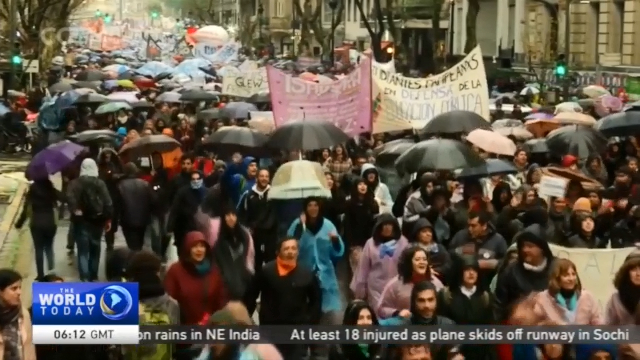
14:48, 01-Sep-2018
Argentina Economy: IMF ready for package of reforms to reduce debt burden
Updated
14:43, 04-Sep-2018
02:14

Argentina's currency has plummeted this week. The government is dealing with a crisis of confidence over its economy and a 50 percent drop in the value of the peso this year. Next week, Treasury Minister Nicolas Dujovne is flying to Washington for talks with the International Monetary Fund. From Washington, Daniel Ryntjes reports.
Students and teachers on the streets of Buenos Aires are demanding more funding for education at a time when the economy has been struggling to grow.
This week, the central bank has been trying to stop a market sell-off of the currency by raising the benchmark lending rate to 60%, one of the highest rates in the world. But it backfired, with a 20% drop in the value of the peso against the U.S. dollar.
NICOLAS DUJOVNE ARGENTINE ECONOMY MINISTER "We understand that there is a process today of distrust in an Argentine economy that, in our opinion, has solid foundations. But we also recognize today it has to reinforce them, based on the shocks to which we have been exposed."
That reinforcement comes in the form of a $50 billion International Monetary Fund lending arrangement that was agreed in July. IMF Managing Director Christine Lagarde is promising to speed up payments. She will meet with Argentina's Finance Minister Nicolas Dujovne on Tuesday.
NICOLAS DUJOVNE ARGENTINE ECONOMY MINISTER "There I plan to meet with the authorities of the International Monetary Fund. We believe that we will be able to move forward quickly because there is already a considerable level of progress and they are the measures we believe in to restore confidence."
The IMF is standing by a package of reforms agreed with the Argentina which are designed to reduce the country's debt burden while emphasizing that effective social programs should remain in place.
DANIEL RYNTJES WASHINGTON "The IMF maintains that Argentina's economic management is now far better than it was when the country's economy collapsed in the early two-thousands, enabling it to better withstand the turbulence it now faces on international markets. Daniel Ryntjes, CGTN, Washington."

SITEMAP
Copyright © 2018 CGTN. Beijing ICP prepared NO.16065310-3
Copyright © 2018 CGTN. Beijing ICP prepared NO.16065310-3